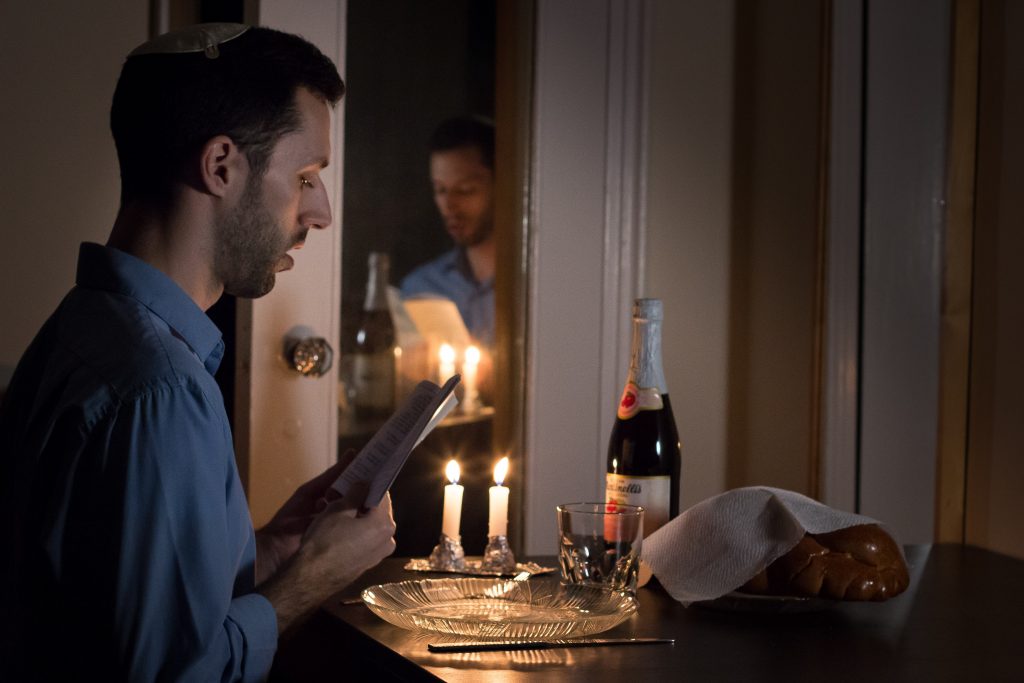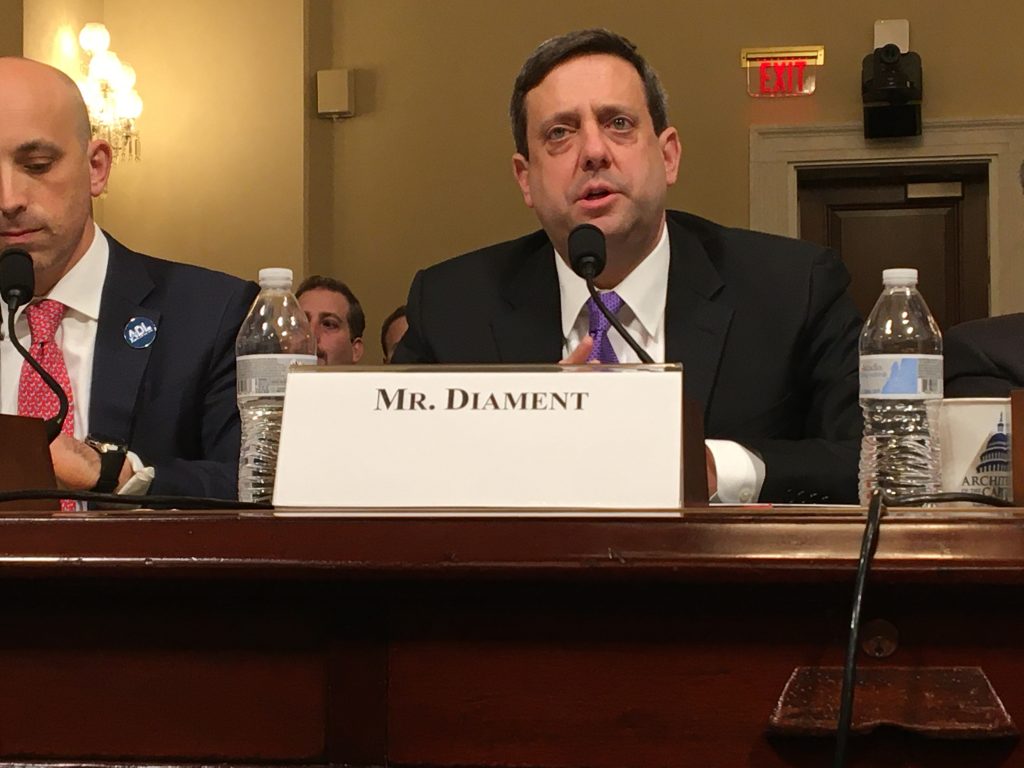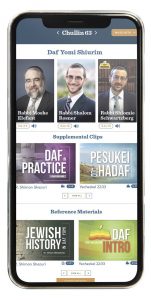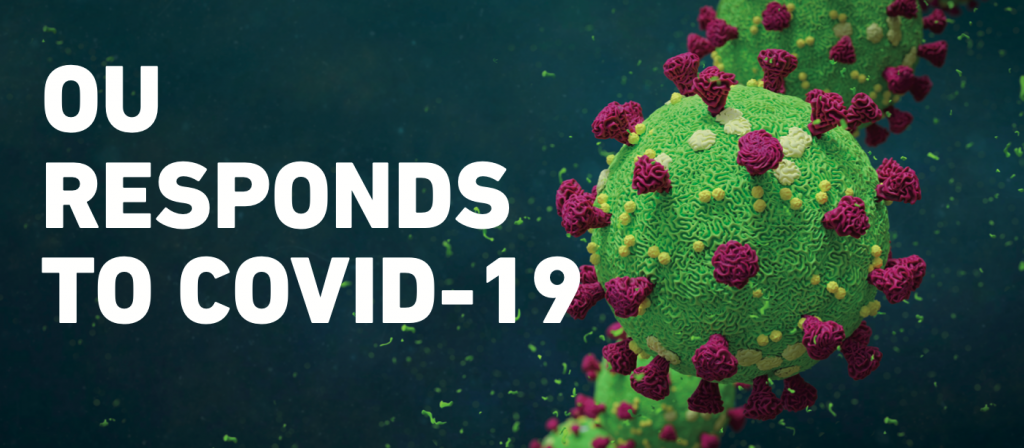Inside the OU – Summer 2020
Happenings Around the OU
Winning Photo Captures Orthodox Singles’ Experience
Congratulations to Lior Melnick of New York, winner of the OU Center for Communal Research’s (CCR) Photo Contest. Run in conjunction with the CCR’s study of the lives of Orthodox Jewish singles, the contest challenged singles to submit an original photo that they feel reflects their life as a single Orthodox Jew. Lior’s winning photo, entitled “Eishet Chayil, Will I Find?”, shows him reciting Eishet Chayil at a staged Friday night dinner, joined only by his reflection. The table is sparsely adorned. His caption: “Married friends own fancy things—Kiddush cups, challah covers, candlesticks. Being single, you make do with tin foil candlesticks and napkin challah covers.”
OU Advocacy Urges Congress to Combat Anti-Semitism
Speaking before the US House Committee on Homeland Security Subcommittee on Intelligence and Counterterrorism in January, OU Advocacy Center Executive Director Nathan Diament urged elected officials to take action against anti-Semitic attacks across the United States—particularly those on visibly Orthodox Jews.
He called for increasing funds available in the Department of Homeland Security’s Nonprofit Security Grant Program, which the OU Advocacy Center spearheaded in 2005, and for allocating a portion of DOJ’s grant to local police departments for the purpose of local police providing greater protection to houses of worship.
Gaining a Chavruta . . . and a Friend
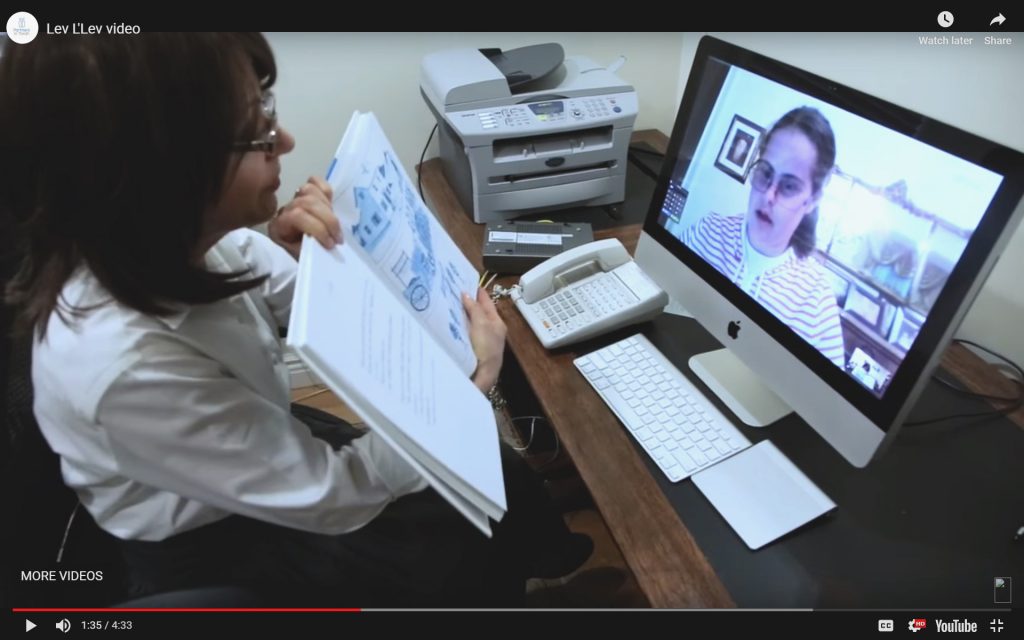
Yachad member Dina Sheva Waldman learning with her Lev L’Lev partner Bayla Sheva Brenner on a video call. Courtesy of Partners in Torah
Connecting those with special needs to friends is especially crucial during these challenging times. Enter Yachad’s Pearl Matlin Lev L’Lev Program—Partners in Torah for Teens and Adults with Special Needs. Sponsored by Yachad and Partners in Torah, the new program—appropriate for all learning levels—connects Yachad members with a study partner to learn Torah by phone or video call once a week. To date, more than eighty-five people are learning Torah weekly, and the number keeps growing. “Our hope is that our members not only walk away with more Torah knowledge but also with a chavruta and friend,” says Rebecca Schrag Mayer, Director, Yachad New York & Informal Education.
To sign up, visit yachad.partnersintorah.org.
All Daf Explodes Across the Globe
With shuls and schools closed in many countries around the world, the All Daf platform has been assisting thousands throughout the globe in their learning experience. More than 32,000 people in 107 countries have downloaded the “All Daf” app, an innovative free digital platform for Daf Yomi learners. Beyond offering shiurim on the daily daf, All Daf offers participants of all backgrounds the opportunity to enhance their learning with a host of topics related to the day’s daf, including Jewish history, lomdut, Tanach and other sources and resources. Continuing to inspire learners during these challenging times, All Daf is easily accessed at alldaf.org and is available for download on your Apple and Android devices from the app stores.
To learn more, visit alldaf.org.
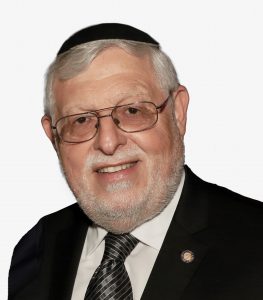 Fond Farewell to Rabbi Kalinsky
Fond Farewell to Rabbi Kalinsky
The OU’s West Coast region bid a fond farewell to Director Rabbi Alan Kalinsky, who retired after nearly thirty-five years of dedicated service. Rabbi Kalinsky built up the West Coast region—the first OU regional office outside the New York area—from very modest beginnings, working both as a mentor to rabbis and as a liaison to OU member synagogues throughout the area. Today, OU West Coast encompasses the entire West Coast region, from Vancouver to San Diego and as far east as Denver. In addition to his organizational and administrative work with the OU, Rabbi Kalinsky has served as a Rabbinic Field Representative for OU Kosher since 1981—a position he will continue to hold—and was rabbi of the Young Israel of North Beverly Hills from 2005 to 2012. Rabbi Kalinsky and his wife Sandy were honored with the Keter Shem Tov award at the West Coast region’s annual banquet.
For nearly thirty-five years, Rabbi Kalinsky has devoted himself to the West Coast region. He is loved by the entire community for it. —OU West Coast Region President Scott Krieger
As the Covid-19 pandemic unfolded, the OU and its Karasick Department of Synagogue and Community Services responded quickly, offering guidance, chizuk and support for OU synagogues and the broader Jewish community. With the input of leading rabbis and a team of infectious disease specialists, the OU provided information and guidance (at together.ou.org), which was updated on a daily basis. From encouraging people to “Stay Home, Save Lives” to urging Covid-19 survivors to donate plasma to providing regulations on mikvah use during the pandemic, the OU became a central address for shuls and community members seeking direction regarding Covid-19. The OU statements—some produced jointly with the Rabbinical Council of America, Agudath Israel, the Vaad of Lakewood and others—have created a new level of communal unity across the country.
Additionally, the OU launched a daily Tehillim and chizuk call. Joined by over 1,000 people each day, the call has the added benefit of introducing the broader community to a wide variety of rabbinic leaders across the nation.
To address the community’s diverse needs during quarantine, the OU has also become a hub for virtual programming, offering programs on a range of issues from shiurim to parenting to financial advice and more.
“We strive to be the source that people turn to for guidance and support while also preparing for the ‘new normal’ once the pandemic is over,” said Naftali Herrmann, Southeast Regional Director, Karasick Department of Synagogue and Community Services, who has spearheaded many of these initiatives.
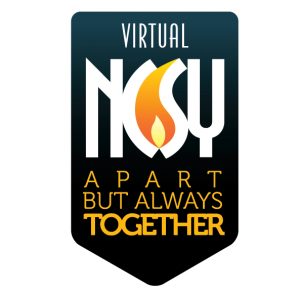 Virtual NCSY: Apart But Always Together
Virtual NCSY: Apart But Always Together
While everything in the world may have changed, NCSY’s dedication to connecting with Jewish teens has remained an important constant. In the first two months following the pandemic outbreak, NCSY produced 2,000 hours of new programming and made these events accessible for free to teens and families across the world. Over 41,000 participants joined NCSY’s Torah classes, virtual JSU clubs, inspirational flash mobs, haggadah collaborations with alumni, challah bakes, Shabbatons in a Box, and concerts with Simcha Leiner and Gad Elbaz. NCSY virtual programming will continue to expand as NCSY aims to offer something for everyone, inspire teens and form relationships that bring us all closer.
To join, please visit ncsy.org/virtual.
OU Israel: Keeping Us Unified
Although the physical OU Israel Center remained shut for weeks, OU Israel staff continued working round the clock to address the needs of its diverse constituents. Since the pandemic erupted, more than 6,800 people participated in 113 Zoom shiurim sponsored by the Center, with an additional 4,500 people participating in more than twenty Facebook Live shiurim and special events. NCSY Israel, Yachad Israel, the Zula and OU Israel Youth all went virtual with their programming while OU Israel Center staff and volunteers offered chizuk and assistance to thousands of Center members.
The over 200 OU Israel staff members have not rested for a moment during this pandemic. We have taken a face-to-face organization and turned it into a virtual face-to-face organization. — OU Israel Executive Director Rabbi Avi Berman
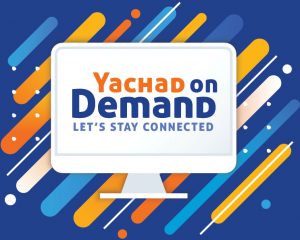 Yachad On Demand: Let’s Stay Connected
Yachad On Demand: Let’s Stay Connected
Launching “Yachad on Demand,” Yachad, the leading organization for those with disabilities in the Jewish community, began offering a plethora of virtual programming including online support groups, an online buddy system, Partners in Torah, and events—such as live cooking demonstrations, shiurim, pre-Shabbat schmoozes and games and educational materials. The Yachad IVDU school system and its day hab programs have switched to a digital model as well, where students participate in all-day virtual classes and programming.
“While we all feel the impact of social distancing, it is particularly challenging for those with special needs who rely heavily upon in-person interconnection,” said OU Executive Vice President Allen Fagin.
For more information, visit yachad.org/yachadondemand.
OU-JLIC: Killing COVID with Kindness
Since campuses closed due to Covid-19 in mid-March, OU-JLIC has continued to engage, support, inspire and educate its students and their families. Whether it’s having virtual coffee dates with students, arranging virtual shiurim, answering she’eilot—even providing home-cooked meals for Pesach to those stuck on campus—OU-JLIC educators have maintained personal connections with students at this critical time.
But perhaps most impressive is the amount of chesed done by OU-JLIC educators for and with their students. For example, an initiative at NYU and incorporating many other campuses, called “Killing COVID with Kindness,” has connected hundreds of students with volunteer opportunities including grocery shopping, packaging and delivering meals, and calling and writing to lonely elderly individuals. Volunteers even provided kosher for Passover food and haggadot for the 110 Jewish patients at the Javits Center Emergency Hospital in New York.
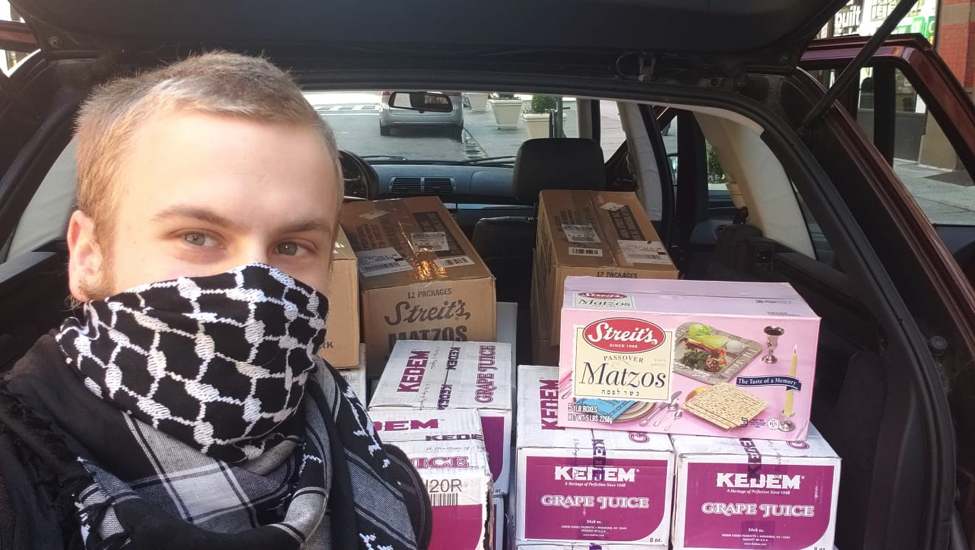
An OU-JLIC student from NYU delivering kosher for Passover food to Jewish patients at the Javits Center Emergency Hospital in New York. Courtesy of Rabbi Joe Wolfson
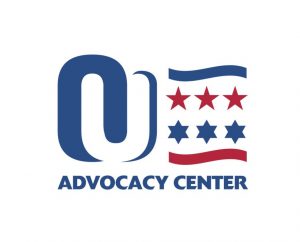 OU Advocacy: Supporting the Charitable Sector
OU Advocacy: Supporting the Charitable Sector
*Information current as of April 27, 2020.
Since the start of the pandemic, the OU Advocacy Center has played a leading role in crafting and advocating for bipartisan federal legislation providing significant assistance for the nonprofit charitable sector.*
In March, much of this advocacy effort came to fruition with the passage of the bipartisan Coronavirus Aid, Relief, and Economic Security (“CARES”) Act, which included nearly $2 trillion in emergency economic stimulus funding. Among its key provisions, the CARES Act provided emergency appropriations to support nonprofits by offering forgivable loans, unemployment insurance expansion, employee retention tax credits, payroll tax credit deferrals, aid for nonpublic schools and FEMA disaster loans. The legislation also provided the nation’s Jewish and other nonpublic K-12 schools with access to a pool of emergency response funds. In April, OU Advocacy successfully worked for the passage of a bill that helped replenish the programs and is among the leaders of a broad coalition of national nonprofit organizations pressing Congress and the Administration for more relief and support for our charitable entities. OU Advocacy has held multiple webinars and calls providing guidance to shul and school leaders on how to access these critical resources.
“OU Advocacy is committed to continuing to work with our elected leaders and coalition partners to serve our community and deliver the support and relief they need,” said OU Advocacy Executive Director Nathan Diament.
“As the coronavirus pandemic strikes communities across the US, we are grateful that we have had success with our allies in Congress and the Trump Administration and delivered critical funds to so many community institutions.”
—OU Advocacy Center Executive Director Nathan Diament
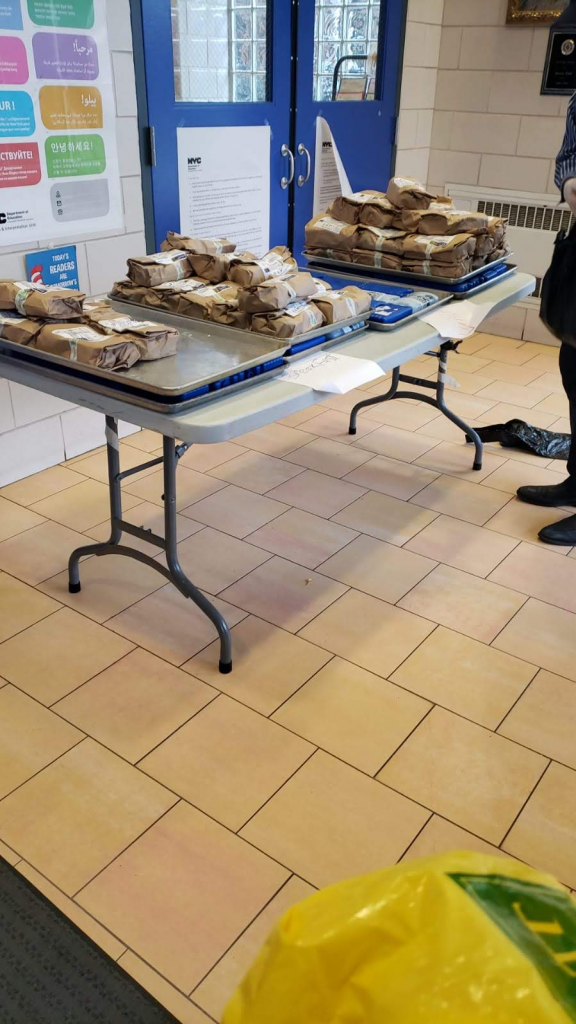
“Grab-and-go” kosher meals at a distribution center in Far Rockaway, New York. Courtesy of Allison Deal
Teach Coalition: Fighting for Our Students
Teach Coalition continues to advocate for nonpublic school inclusion in all relief appropriations. This includes access to state and local funds, free “Grab-and-Go” meals, the continuation of specialized services and the availability of necessary equipment and programs for remote learning.
In a critical win this past April, Teach Coalition branches in New York, Pennsylvania, Maryland and Florida were instrumental in successfully securing kosher and halal meal options at “grab-and-go” free meal distribution centers in New York City, Philadelphia, Montgomery County, PA, and South Florida respectively, ensuring that all students have access to nutritious meals in these challenging times. April also saw Teach New York successfully advocate for free iPads for nonpublic school students with Individualized Education Plans (IEPs), as well as 7,000 Chromebooks and 20,000 flip-phones for New York City yeshivah students.
“Pandemics and the tragic suffering left in their wake do not discriminate. Every day of delay is another day that state and local governments fail in their responsibility to serve every student in distress. It is time for all states and cities to take meaningful steps toward equitable services and funding,” said OU Chief of Staff and Teach Coalition Executive Director Maury Litwack.
New Positions & Promotions
Welcome to . . .
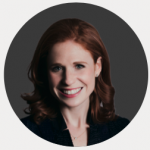 . . . Katie Katz, Executive Director, Teach New Jersey. Katie oversees Teach NJ’s annual campaign, community engagement and mobilization efforts across the state. She joined Teach NJ from the Englewood Health Foundation. Katie holds an MBA from Brandeis University in nonprofit management as well as a master’s degree in Jewish professional leadership. She lives in Teaneck, New Jersey with her family.
. . . Katie Katz, Executive Director, Teach New Jersey. Katie oversees Teach NJ’s annual campaign, community engagement and mobilization efforts across the state. She joined Teach NJ from the Englewood Health Foundation. Katie holds an MBA from Brandeis University in nonprofit management as well as a master’s degree in Jewish professional leadership. She lives in Teaneck, New Jersey with her family.
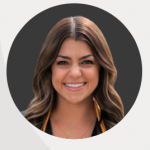 . . . Emily Slavkin, Associate Director of Grassroots Engagement, Teach New York. Originally from Orlando, Florida, Emily has interned for Congressman Ted Deutch (FL-22) and AIPAC in Washington, DC. Additionally, she interned for UN Watch in Geneva, Switzerland. A recent graduate of the University of Michigan, she holds degrees in political science and Judaic studies.
. . . Emily Slavkin, Associate Director of Grassroots Engagement, Teach New York. Originally from Orlando, Florida, Emily has interned for Congressman Ted Deutch (FL-22) and AIPAC in Washington, DC. Additionally, she interned for UN Watch in Geneva, Switzerland. A recent graduate of the University of Michigan, she holds degrees in political science and Judaic studies.
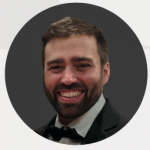 . . . Drew Feld, Associate Director of Marketing Operations, OU Marketing and Communications. In his role, Drew is charged with introducing and leading the project management discipline within the Marketing and Communications Department. His responsibilities include designing processes, managing risk and serving as a strategic production advisor for the department. Drew has been a project management professional since 2013 for both marketing agencies and in-house companies. He lives in Riverdale, New York with his family.
. . . Drew Feld, Associate Director of Marketing Operations, OU Marketing and Communications. In his role, Drew is charged with introducing and leading the project management discipline within the Marketing and Communications Department. His responsibilities include designing processes, managing risk and serving as a strategic production advisor for the department. Drew has been a project management professional since 2013 for both marketing agencies and in-house companies. He lives in Riverdale, New York with his family.
Congratulations to . . .
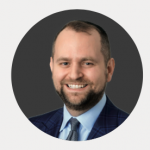 . . . Maury Litwack, Executive Director, Teach Coalition, who was included in City and State’s 2020 “Education 100”—the magazine’s annual list of the 100 most influential people in New York State’s education policy arena.
. . . Maury Litwack, Executive Director, Teach Coalition, who was included in City and State’s 2020 “Education 100”—the magazine’s annual list of the 100 most influential people in New York State’s education policy arena.
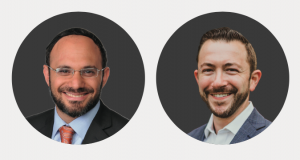 . . . Rabbi Adir Posy and Solly Hess, who have been named dual successors to retiring Director of OU West Coast Rabbi Alan Kalinsky. While continuing to serve as National Director of the OU’s Karasick Department of Synagogue and Community Services, Rabbi Posy will work with OU member synagogues on the West Coast to provide vision, leadership, and programmatic support throughout the region. Rabbi Posy is the former Assistant Director of OU’s West Coast region and has served the National Director of Synagogue and Community Services for the last three years. Solly will serve as OU Director of Institutional Advancement, West Coast, overseeing all of OU West Coast’s fundraising efforts and working with various OU programs to enhance their respective visibility and maximize their impact. Solly’s previous work with the OU includes running West Coast NCSY, during which time he helped revitalize the West Coast region. Most recently, Solly served as the Western States Regional Director of OU’s Synagogue and Community Services.
. . . Rabbi Adir Posy and Solly Hess, who have been named dual successors to retiring Director of OU West Coast Rabbi Alan Kalinsky. While continuing to serve as National Director of the OU’s Karasick Department of Synagogue and Community Services, Rabbi Posy will work with OU member synagogues on the West Coast to provide vision, leadership, and programmatic support throughout the region. Rabbi Posy is the former Assistant Director of OU’s West Coast region and has served the National Director of Synagogue and Community Services for the last three years. Solly will serve as OU Director of Institutional Advancement, West Coast, overseeing all of OU West Coast’s fundraising efforts and working with various OU programs to enhance their respective visibility and maximize their impact. Solly’s previous work with the OU includes running West Coast NCSY, during which time he helped revitalize the West Coast region. Most recently, Solly served as the Western States Regional Director of OU’s Synagogue and Community Services.
Women in Action
WI Responds to Coronavirus Outbreak
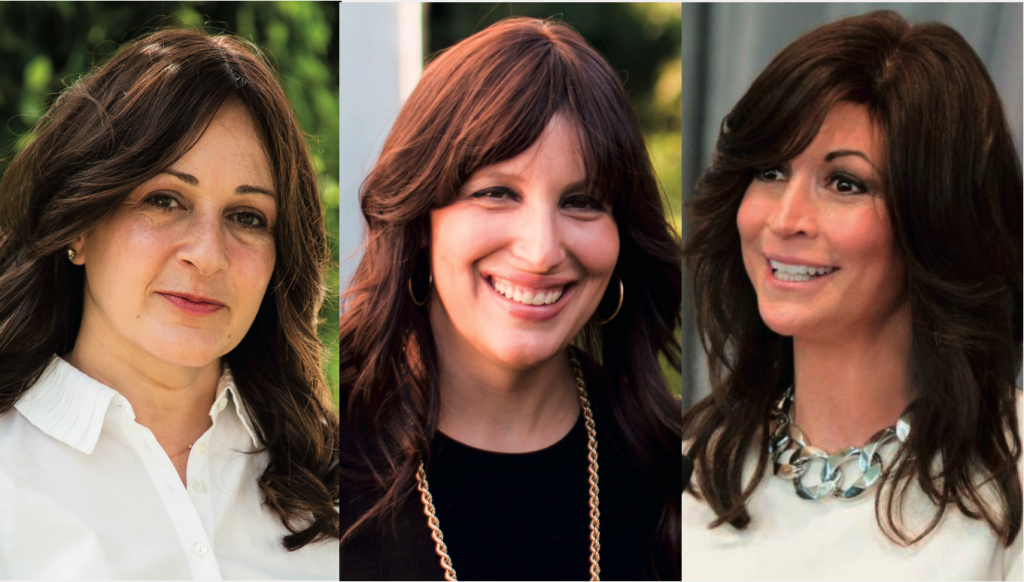
Dr. Chana Gelb (left) Rebbetzin Dr. Malka Ismach (center), and Mrs. Slovie Jungreis Wolff were among the presenters for WI’s varied and diverse virtual programming for women.
In light of Covid-19, the OU’s Women’s Initiative (WI)
sponsored a number of important programs to support and encourage the women of our community.
Mikvah professionals webinars: Two hundred women participated in the webinars in support of mikvah staff and directors, which were presented by Rabbi Yaakov and Rebbetzin Peshi Neuberger of Congregation Beth Abraham of Bergenfield, New Jersey.
Rebbetzin webinar: With the significant pressures placed on rebbetzins during this challenging time, this webinar offered chizuk and insight to rebbetzins. Presenters included Rebbetzin Dr. Yael Muskat, Director of the Counseling Center at Yeshiva University’s Stern College for Women and Zahava Farbman, Associate Director of Crisis Intervention, Trauma and Bereavement Services for Chai Lifeline’s Project C.H.A.I.
“Seder Ideas and Inspiration”: In partnership with with OU Israel’s L’Ayla and the Office of the Chief Rabbi UK, WI launched a three-part virtual learning series to help women prepare spiritually for Pesach. Nearly 1,200 women participated in the series, held over the three Sundays prior to Pesach. Presenters Slovie Jungreis Wolff of New York, Raisel Freedman of London and Dr. Chana Tannenbaum of Israel brought their unique perspectives on the themes of freedom, redemption and introspection.
“Building Safe Spaces, Building You”: Close to two hundred women participated in this national support program for women, which offered practical advice and chizuk, presented by Zahava Farbman.
Torat Imecha Nach Yomi Siyum: Over 250 women from across the globe joined a virtual Zoom siyum on the completion of Sefer Shmuel I, presented by Sara Malka Reichman, the Sefer Shmuel instructor.
“Cope and Hope”: WI offered a series of four webinars targeted to help community members in different family situations navigate the unfolding Covid- 19 crisis, presented by psychologists Dr. Aliza Septimus, Rebbetzin Dr. Rachel Levine, Dr. Chana Gelb and Rebbetzin Dr. Malka Ismach.
Coming Soon From OU Press
Sephardic Savvy
By Rabbi Haim Jachter
OU Press
As the rabbi of a Sephardic synagogue who is himself of Ashkenazic descent, Rabbi Haim Jachter has a unique vantage point from which to observe the differences in customs and halachot between Ashkenazim and Sephardim. In addition, Rabbi Jachter is well-known for his clarity of presentation and broad range of Torah knowledge. In his latest work, Sephardic Savvy, Rabbi Jachter applies his expertise to explicating an encyclopedic array of divergences between Ashkenazi and Sephardi halachic practice, while also capturing the diversity within different Sephardic communities.
This fascinating work begins with an overview of opinions on lo titgodedu—the prohibition of forming factions in Judaism—and how that impacts the practices of an Ashkenazi praying in a Sephardic synagogue and vice versa. (Unsurprisingly, Ashkenazic and Sephardic posekim may differ on this meta-issue as well.) The book concludes with chapters on Yemenite and Moroccan halachah as well as overviews of the halachic approaches of some of the major Sephardic posekim of the last century: Rav Ovadia Yosef, Rav Shalom Messas, Rav Mordechai Eliyahu, Rav Ben Tzion Abba Shaul, and Rav Hayim David Halevy.
The intervening chapters discuss a plethora of issues which separate Ashkenazim and Sephardim, from the well-known to the obscure. In each chapter, Rabbi Jachter provides the sources and rationales behind the practice of each community, on questions ranging from the proper pronunciation of God’s name and whether one should sit or stand during Kaddish to eating kitniyot on Pesach (and eating in the home of someone with a different practice than one’s own), and the standards for reciting Sheva Berachot, to give but a few examples. Throughout, Rabbi Jachter explains the opinions of both earlier and contemporary posekim and demonstrates how halachah unfolds in often unexpected ways. Moreover, in developing the rationales for both sides of each issue, this book sheds much light on the dialectical back-and-forth of the halachic system as a whole.
Sephardic Savvy is essential reading for Jews of all origins who are interested in understanding their own practices and appreciating those of their neighbors, and in seeing the full mosaic of halachah created through the diversity of its parts.
Lechaber Et Ha-Ohel: Thoughts on Connections in Tanach and Chazal
By Michael Kaiser
OU Press
This highly original work consists of essays on an array of topics related to themes in Jewish thought and the Jewish holidays. Building upon the works of a wide variety of masters of machshavah, such as Sefat Emet and Shem miShmuel as well as Rabbi Gedalyah Schorr’s Or Gedalyahu and Rabbi Chaim Yaakov Goldvicht’s Asufat Ma’arachot, among many others, the author engages in close readings of primary sources in Tanach and Chazal to reveal the underlying thematic connections between different areas of the Torah. For example, in an essay about the korban haomer brought on the second day of Pesach and how it relates to Creation, the author explores the connection between the korban haomer and the manna eaten in the desert, the Written Law and the Oral Law, brit milah and Amalek, as well as Lag Ba’Omer and Chanukah. Some of the other essays in the volume discuss: Megillat Rut and its underlying themes, the conflict between Lavan and Yaakov as well as between Bilaam and the Jewish people, the meaning of the enigmatic phrase “Sefer HaYashar” which appears twice in Tanach, and the midrashic encounter between Yaakov and Elifaz which portends the eternal struggle between Amalek and the Jewish people.
While this work requires effort on the part of the reader and contains numerous Hebrew citations from a variety of sometimes abstruse sefarim, the reader’s efforts are richly rewarded. In his foreword, Rabbi Jacob J. Schacter, who persuaded the author to publish this work, writes: “I have consistently been absolutely overwhelmed by [the essays’] profundity, depth, wisdom, creativity and originality. I have learned a great deal from each one of them and been captured by their dazzling brilliance, one by one. They were never an easy read; I had to work at trying to understand them. But they have always been worth the investment of my time and energy.” This is an important volume for those interested in deep study of Tanach and Chazal and advanced machshavah.

